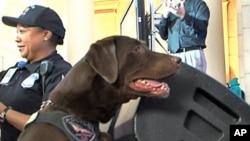The U.S. military raid on Osama bin Laden's hideout in Pakistan reportedly turned up plans by al-Qaida to attack U.S. trains. Security has been heightened in and around the nation's trains and subway systems. Authorities are turning to dogs, so called K-9 units, to guard against possible terrorist attacks among security measures. K-9 is an abbreviation for the word canine.
This chocolate Labrador Retriever named Levy is a bomb sniffing dog. He is trained to find explosives hidden in bags and suitcases.
Levy is one of the dogs that make up Amtrak's 48 K-9 units. They are on the frontline of protecting some of the 78,000 people who ride the nation's intercity passenger railroad everyday. Amtrak Police Inspector William Parker.
"These dogs are the first line of defense and we have been doing this since 2007 when we expanded our program," said Parker. "They ride the trains, check unattended bags and go to suspicious calls to determine if it is suspicious or not."
Fifteen of the dogs are specifically trained to detect explosives on suicide bombers. Besides taking train rides, bomb sniffing dogs are on patrol at the nation's largest train stations. Parker says the K-9 units are making a difference.
"Well, if a bomb dog does a 150 searches a month and nothing blows up that means he did a good job," he said.
Bomb sniffing dogs also are used to protect commuter rail systems in major cities. But train bombings like the one in Madrid in 2004 that killed 191 people and the subway bombing in London in 2005 underscore how vulnerable passenger trains are to a terrorist attack. Richard Maloney is a spokesman for Philadelphia's transit system.
"We understand the vulnerabilities of an open public transportation system which has to remain open so we can function," said Maloney. "So people can get to work and school."
U.S. law enforcement officials say intelligence gathered from Osama bin Laden's house showed al-Qaida has considered attacking the U.S. rail system on the 10th anniversary of the September 11th terrorist attacks. Officials say al-Qaida's plan also called for tampering with train tracks, hoping to send a train off a bridge or into a valley. Richard Clarke is a counterterrorism analyst.
"You cannot guard hundreds of miles of track," said Clarke. "And if they [the terrorists] can get to one location that is not well guarded and put explosives on it, do something to cause the train to derail that is a lot easier than going after an aircraft."
Kevin Lynch, a former freight rail police chief, agrees. He says a terrorist attack on the U.S. rail network could disrupt commerce across the country.
"The targeting of the railroad infrastructure itself is a much smarter move on the part of the terrorists, because you get more bang for the buck," said Lynch.
Law enforcement officials are promising heightened vigilance in order to thwart any attempt by al-Qaida to attack the nation's railroads or commuter trains.




